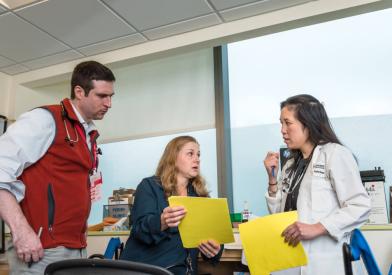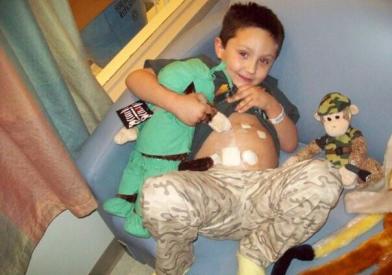What Are Adrenal Tumors?
Adrenal tumors are masses that grow in the adrenal gland, the organ responsible for producing hormones in response to physical and emotional stress.
Adrenal tumors may be functioning or non-functioning, meaning that some produce hormones, and some do not. Functioning tumors have extra hormones that can cause early puberty, high blood pressure, sweating, headaches, and abdominal pain. Non-functioning tumors don't make excess hormones.
- Adrenal tumors types include:
- Adrenal adenomas
- Adrenocortical carcinomas (ACCs)
- Pheochromocytomas
- Adrenal adenomas are relatively common, occurring in 5-10 percent of the population, while ACCs are rare.
- In children, ACCs are most common in patients under the age of six.
- In teenagers, ACCs are more common in girls.
- If your child is diagnosed with ACC, we recommend genetic counseling as many occur in the setting of a hereditary cancer syndrome called Li-Fraumeni syndrome.
At Dana-Farber/Boston Children's Cancer and Blood Disorders Center, we offer the combined expertise of a leading cancer center and a premier children's hospital in one specialized program. Your child's expert care team in our Endocrine-Oncology Program will include oncologists, endocrinologists, genetic counselors, surgeons, and support staff. Their goal is to provide your child with the best possible care and treatment.
Causes and Symptoms of Childhood Adrenal Tumors
As a parent, you undoubtedly want to know what may have caused your child's tumor. It's important to understand that tumors often emerge with no known cause. Many may result from the combined effects of genetic and environmental factors.
Adrenocortical carcinomas (ACCs) are often linked to genetic conditions, most often Li-Fraumeni syndrome. About 50-80 percent of pediatric ACC patients have this syndrome. Other related conditions include:
- Multiple endocrine neoplasia type 1 (MEN1)
- Lynch syndrome
- Beckwith-Wiedemann syndrome
- Hemihypertrophy
Pheochromocytomas are associated with the following conditions:
- Neurofibromatosis
- von Hippel-Lindau disease
- Multiple endocrine neoplasia (MEN) syndromes
- Tuberous sclerosis
- Sturge-Weber syndrome
- Ataxia-telangiectasia
The symptoms of adrenal tumors may vary from child to child. Symptoms will depend on the tumor location and type. While your child may experience no symptoms, if they do occur, they may include:
- Abdominal pain, fullness, or the presence of an abdominal lump if the tumor does not produce hormones.
- Weight changes, high blood pressure, or early onset of pubertal changes (voice deepening, pubic hair, body odor, acne, or breast tissue developing early) if a tumor produces hormones.
- High blood pressure, rapid pulse, headache, nausea, or sweating from a pheochromocytoma.
Because many of these symptoms can also point to other conditions, it's essential to have your child evaluated by a qualified medical professional.
How We Diagnose and Stage Childhood Adrenal Tumors
The first step in treating your child is forming an accurate and complete diagnosis. Your child's physician may order several diagnostic tests, including advanced imaging studies, biopsy, and blood and urine tests.
Once the diagnosis is complete, your child's medical team will determine the tumor's stage or classification (a way of describing the tumor's location and spread).
Adenomas and pheochromocytomas are most often benign (noncancerous), although pheochromocytomas can occasionally become malignant (cancerous). Adrenocortical carcinomas (ACCs) are malignant tumors, and doctors further classify them by their stage.
How We Treat Childhood Adrenal Tumors
Treatment for your child's adrenal tumor will depend on the type of tumor your child has and whether it's malignant. Your child's doctor may recommend:
- Surgery: Surgery may involve a biopsy, removal of the entire tumor and nearby tissue, and possibly removing the adrenal gland. We use a minimally invasive approach, or laparoscopy, whenever possible.
- Radiation therapy: This treatment uses high-energy rays from a specialized machine to damage or eliminate cancer cells and shrink tumors. We often use radiation therapy together with surgery, either before or after the removal of the cancer.
-
Chemotherapy: We may use chemotherapy, a drug treatment that aims to destroy or shrink cancer cells, before or after surgery.
Different groups of chemotherapy drugs work in different ways. Often, we will use a combination of chemotherapy drugs. Your child may receive chemotherapy:
- Orally, as a pill to swallow.
- Intramuscularly, as an injection into the muscle or fat tissue.
- Intravenously, as a direct injection into the bloodstream or IV.
- Intrathecally, as a direct injection into the spinal column through a needle.
While chemotherapy effectively treats certain cancers, the drugs cannot differentiate normal healthy cells from cancer cells. As a result, there may be adverse side effects during treatment. Being able to anticipate these side effects can help the care team, child, and family prepare for, and in some cases prevent these complications from occurring.
- Medication: We may use medication as further treatment with certain types of adrenal tumors. Sometimes before removing a pheochromocytoma, your child's physician may prescribe medicine to control high blood pressure. We may also recommend medication to treat excessive hormone production in functioning tumors.
Children treated for adrenal tumors should visit our pediatric cancer survivorship programs every year to manage disease complications, screen for early recurrence of cancer, and manage late effects of treatment. We also provide counseling and support groups.


